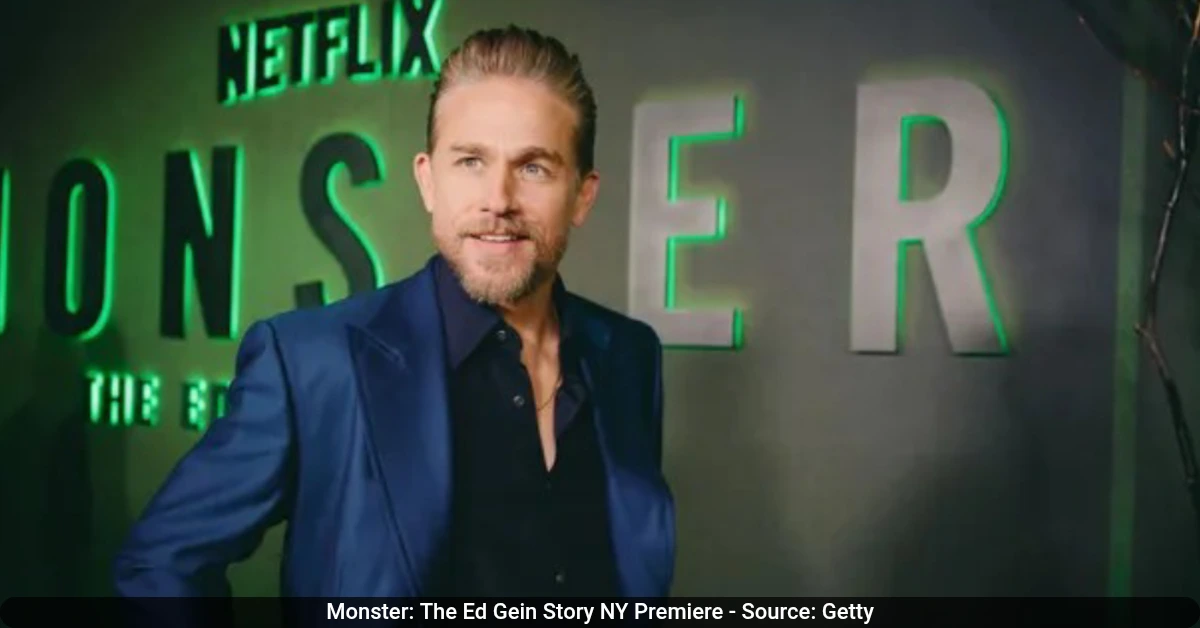The new Netflix series Monster: The Ed Gein Story is sparking intense debate online. The show’s star, Charlie Hunnam, is standing by his complex portrayal of the infamous serial killer, but his comments and the show’s graphic content have drawn significant criticism from viewers and reviewers alike.
The third season of Ryan Murphy’s Monster anthology, which debuted on October 3, 2025, explores the life of Ed Gein, the 1950s killer whose crimes inspired characters in Psycho, The Silence of the Lambs, and The Texas Chain Saw Massacre. Unlike previous seasons, this installment has been met with accusations that it glamorizes its subject and exploits gruesome acts without clear moral purpose.
Charlie Hunnam’s Stance on Playing Ed Gein
Charlie Hunnam has openly discussed the deep moral conflict he felt about taking on the role. He dedicated significant effort to understanding Gein’s psychology, aiming to humanize the man behind the monstrous acts.
The actor described finding a “gentle” and “childlike” quality in Gein through his research into extensive medical records. Hunnam stated his goal was not to create a simple monster but to explore a “human being” who was looking for love and connection, albeit in profoundly dark and perverse ways. He argued that making the character relatable is what makes the story truly frightening and thought-provoking.
“I never felt like we were sensationalizing it. I never felt on set that we did anything gratuitous or for shock impact. It was all in order to try to tell this story as honestly as we could,” Hunnam told The Hollywood Reporter.
To prepare, Hunnam tracked down a rare, legally inadmissible audio tape of Gein from the night of his arrest. This tape helped him develop Gein’s distinctive, high-pitched, and childlike voice, which he saw as an affectation to please his domineering mother.
Why the Show Is Facing Backlash
Criticism of the series began even before its release, after a trailer showed Hunnam shirtless and in intimate scenes with corpses. Many viewers accused the show of sexualizing and glamorizing a serial killer, with some suggesting the handsome actor made Gein look like a “rock star.”
This backlash grew when Hunnam described Ed Gein as “one of the more gentle monsters” in an interview, explaining that the show explores his “human side.” For an audience familiar with Gein’s real-life crimes of murder, grave robbing, and creating objects from human skin, this sympathetic approach was difficult to accept.
Professional reviews have echoed this sentiment. A common criticism is that the series lingers on graphic and violent imagery without providing a meaningful moral framework. One review called the show “a voyeuristic pandering to the basest instincts of viewers,” utterly devoid of morality. Another described it as “awful,” pointing to its “narrative chaos and thematic hypocrisies.”
The show has also been criticized for its historical inaccuracies and for including fabricated plot points, such as a storyline where Gein helps capture Ted Bundy. Reviewers noted that the series tries to critique media exploitation of true crime while simultaneously being guilty of that same exploitation.
The Show’s Explanation and Defenses
The creators of Monster: The Ed Gein Story have defended the series, stating that its goal is to turn the camera back on the audience and society. The season repeatedly asks the question: “Who is the real monster?”
Co-creator Ian Brennan has argued that the series is not exploitative but is instead a “deep dive” into a significant cultural touchstone. He emphasizes that the show explores how the images and stories we consume can have a corrosive impact.
“This whole series, it turns the camera right on us,” Brennan said. “It really matters what you look at and the images and stories you consume. They do stick with you, and they do have an impact.”
A key theme is the argument that Gein was a mentally ill man—diagnosed with schizophrenia—whose horrific acts were influenced by his own exposure to violent imagery, including photographs of Nazi atrocities. The series suggests that the media figures who later sensationalized his crimes, like Alfred Hitchcock, and the public who consumes them, share a degree of complicity.
In a pivotal scene, Ed Gein breaks the fourth wall, looks directly at the camera, and tells the viewer, “You’re the one who can’t look away.” This moment encapsulates the show’s self-aware critique of the true-crime genre and its audience.
A Look at the Character of Ed Gein
The series portrays Ed Gein as a product of severe childhood abuse and isolation. His life on an isolated Wisconsin farm was dominated by his fervently religious and viciously hateful mother, Augusta, played by Laurie Metcalf. The show suggests that her death left him utterly alone, leading him to develop an obsession with women, dead or alive, who resembled her.
A significant part of the narrative involves his relationship with a neighbor, Adeline Watkins, played by Suzanna Son. The show presents Adeline as a real person, though it acknowledges that information about her is thin and that some interpretations, including Hunnam’s own, saw her as partly a fantasy in Gein’s mind. Adeline is depicted as the one who introduces Gein to graphic images of Holocaust concentration camps and Nazi war criminal Ilse Koch, fueling his dark fascinations.
The series also dedicates substantial screen time to showing how Gein’s crimes directly inspired the creation of Norman Bates, Leatherface, and Buffalo Bill, featuring characters like Alfred Hitchcock and The Texas Chain Saw Massacre director Tobe Hooper.
Despite the strong performances, particularly from Hunnam and Metcalf, many reviewers feel the show’s execution fails to justify its violent content. Criticisms highlight that the series is often “unfocused,” “overlong,” and “graphically violent” without the deeper insight it claims to offer.
As of now, Monster: The Ed Gein Story is available to stream in its entirety on Netflix, continuing to generate discussion about the limits of true-crime storytelling.
Also Read: Monster Season 4 Brings Charlie Hunnam Back as a Victim in Lizzie Borden Story






























